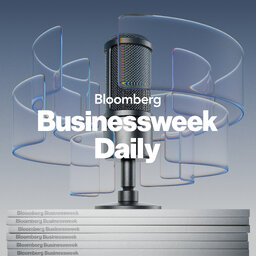Day Two, Part Two at the US Open
Jon Wertheim, Executive Editor at Sports Illustrated, talks about the interesting story lines at the US Open. Chris Studley, Senior Director of Event Services at the USTA, discusses what to eat and drink at the Open.
Hosts: Carol Massar and Tim Stenovec. Producer: Paul Brennan.
In 1 playlist(s)
Bloomberg Businessweek
Carol Massar and Tim Stenovec bring you reporting from the magazine that helps global leaders stay a…Social links
Follow podcast
Recent clips

Bloomberg Businessweek Weekend - January 16th, 2026
1:15:43

Trump Wants Tech Giants to Pay for Power. They’d Love To.
30:14

Family-Owned Toymaker Waiting on the Supreme Court
11:53
 Bloomberg Businessweek
Bloomberg Businessweek